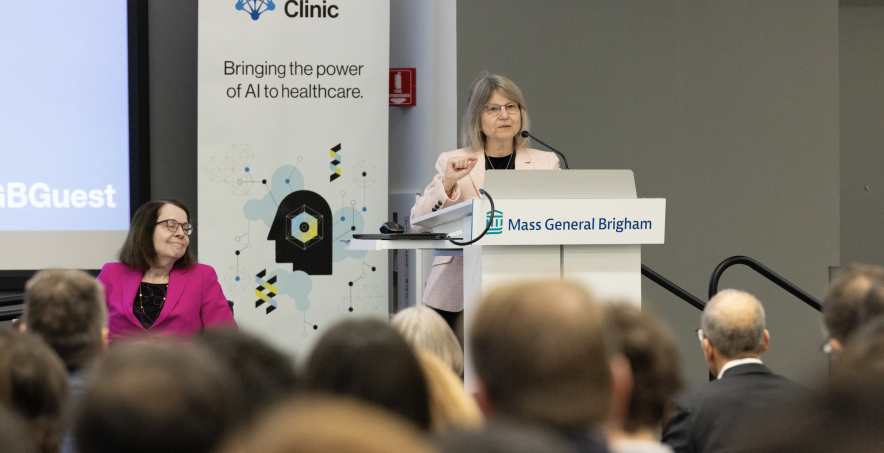Embracing AI’s permanence: navigating medicine’s evolution

On the morning of April 1, 2024 over 500 artificial intelligence researchers, clinicians, and industry experts filled a room, chattering about the state of AI in health.
That Monday, Mass General Brigham (MGB) President and CEO Anne Klibanski welcomed MIT President Sally Kornbluth to her first MIT-MGB AI Cures Conference since her arrival at MIT from the Duke University School of Medicine in January 2023.
It was the third edition of the AI Cures Conference co-organized by the MIT Abdul Latif Jameel Clinic for Machine Learning in Health (MIT Jameel Clinic) and MGB, but it was also MGB’s first time hosting the event on their premises, with the previous two editions taking place at MIT’s Samberg Conference Center.
The purpose of the event was to showcase existing research collaborations between the two institutions, while creating opportunities for new collaborations between MIT and MGB that could transform patient care.
“As someone who still has fresh eyes on the wonders of this cross-institutional community, I want to give you a sense of what it looks like to me,” Kornbluth stated in her opening remarks.“The experience of being surrounded by people who all seem to share an exuberant curiosity, a pervasive ethic of service and the baseline expectation that we’re all interested in impact and in making a difference in the real world…it’s just intoxicating!”
Kornbluth emphasized greater Boston’s “triple-threat strength” status as a “premier hub of clinical excellence, biomedical research and AI expertise.”
“It’s increasingly clear that many of the most important applications we can imagine are related to human health and wellness,” Kornbluth said, underscoring Newsweek’s recent recognition of MIT researchers in its “10 Best Hospitals in the World” list, which included MGB.
In their explanation of MGB’s nomination, Newsweek notably featured Sybil, a deep learning model for lung cancer risk assessment that was collaboratively developed by researchers at MIT, MGB, and Chang Gang Memorial Hospital in Taiwan.
Following Kornbluth’s opening remarks, the New England Journal of Medicine AI’s Editor-In-Chief Isaac Kohane and the President of Spaulding Rehabilitation Hospital Ross Zafonte both gave keynotes offering two different perspectives on AI in medicine.
“There are many things that give us great faith that [AI] will be transformative,” Kohane said, offering an overview of AI’s progress in medicine while acknowledging the “AI winter” of the 1990s and early 2000s. “I know what disappointment looks like,” he added. “That’s why I’m optimistic we’re still in the early days.”
Zafonte’s keynote brought attention to major opportunities for AI in the field of physical medicine and rehabilitation (PM&R). Armed with an array of graphs, videos and diagrams, Zafonte lamented the high variability in rehabilitation outcomes due to lack of specificity and a profound shortage of therapists for long-term care. “We can’t generate enough therapists to do the mass practice that’s necessary for recovery,” he said. “It’s just not going to happen.”
As part of the collaboration between MIT and MGB, six research proposals co-led by MIT and MGB principal investigators were awarded with the AI Cures Grant. At AI Cures 2024, four out of the six awarded proposals were presented by MIT faculty members affiliated with the Jameel Clinic, which included:
- Assistant Professor of Electrical Engineering and Computer Science (MIT EECS) Marzyeh Ghassemi presented ongoing work with Vesela Kovacheva, Director of Translational Research in OB Anesthesia at Brigham and Women’s Hospital, in building a maternal health mortality risk assessment model to aid in the U.S. maternal mortality crisis.
- Henry Ellis Warren (1894) EECS Professor Polina Golland presented her collaboration with Mass General Hospital (MGH) Stroke Division Chief Natalia Rost in using AI to predict the trajectories of stroke patients to reduce the likelihood of age-related disease burdens and long-term disability.
- Thuan and Nicole Pham (1990) Professor of EECS Dina Katabi spoke about her collaboration with Aleksandar Videnovic, the Director of the Division of Sleep Medicine in MGH, which aims to create a multimodal model capable of assessing multiple sleep-related biomarkers for detecting and monitoring the progression of Parkinson’s disease.
- Assistant Professor of EECS Ashia Wilson joined the stage with Co-Director of the Harvard Ophthalmology AI Lab Mengyu Wang to discuss their work in building a fairer screening model for diabetic retinopathy, a condition which can cause blindness that affects one third of patients with diabetes.
All six research projects are now officially in-progress and researchers hope to have results to share at the 2025 edition of MIT-MGB AI Cures Conference. But conference attendees were warned not to become complacent.
“There are several things that we can do to encourage interactions between [MIT and MGB],” MIT School of Engineering Distinguished Professor of AI and Health Regina Barzilay said in her fireside chat with MIT President Emerita Susan Hockfield and MGB Chief Innovation Officer Chris Coburn. Barzilay, who is also the AI faculty lead of the Jameel Clinic, emphasized the need to streamline data access between the two institutions.
“One of the current realities is that it may take up to three years to finalize data sharing,” Barzilay said, pointing out the obstacles to her own work in building an AI model for early detection of pancreatic cancer. “This is truly crucial because many faculty and students say ‘I don’t want to work on clinical data because it’s so logistically complicated,’ so if we improve this path, we would bring a lot of people in.”

